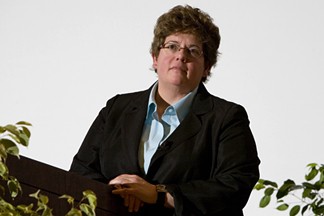Provost promotes a 'competitive' Cornell that defines its research and education values on its own terms
By Anne Ju
Cornell is striving to remain competitive among its peer institutions, with beefed up financial-aid packages, but government pressure to support more of this aid from the university's endowment can take a toll on investments into research and teaching. So cautioned Provost Biddy Martin in her second annual Academic State of the University Address, March 5.
Martin also cautioned the audience in Kennedy Hall's Call Auditorium that although the way Cornell is perceived through popular rankings published by U.S. News and World Report (in which Cornell was most recently ranked 12th nationally) is important, more weight should be placed on qualities that cannot be reflected in such narrow analyses.
Cornell's goal, she said, should be to remain a world-class research university that offers both undergraduate and graduate students a top-flight education.
"We can worry about our rankings, or we can be who we are and define our value in our own terms, taking advantage of what makes Cornell unique," Martin said.
Her wish is not for Cornell to be uncompetitive, she emphasized, but for it to compete on the basis of its unique strengths and not to worry so much about external factors.
"What I think we can do is compete on the basis of our strength and our values. That is, compete with integrity, which I believe Cornell has always done," she said.
Martin also described some of the challenges such institutions as Cornell face to stay competitive, while dealing with increased scrutiny and specific measures of accountability. For example, there is growing pressure from government to make education more affordable by using university endowment funds to replace student loans with grants, Martin said.
The provost referred to recent requests from the U.S. Senate Finance Committee for detailed information on endowment growth and spending aid from 136 U.S. colleges and universities with endowments of $500 million or more. President David Skorton responded to the committee's 11 questions, but, said Martin, "the real concern is how this will be used."
"A very major concern I have," she said, is that the underlying assumption appears to be that any endowment over $500 million, or $1 billion, should be adequate to allow a university to shift funds to financial aid or even to reduce or eliminate tuition. "Meanwhile, the cost of educating a student continues to rise and outstrip tuition," she said. At the same time the costs of research are growing even more dramatically and the government's share of funding research appears to be going down.
Martin noted that Cornell recently made a commitment to enhance its financial-aid packages and eliminate loans for students from families making $75,000 or less, and to cap loans for students from families making between $75,000 and $120,000. These enhancements will be funded in part by increased rates of payout from the Cornell endowment. (In his reply to the Senate Finance Committee, Skorton noted that of the $109.9 million in grant aid that Cornell expects to spend on undergraduate financial aid in 2007-08, $28.1 million, or 25.6 percent, will come from endowment payout. He said that Cornell's current campaign seeks to increase financial aid endowment principal by $225 million, which will augment the payout by $11.3 million annually.)
But universities like Cornell cannot afford to rely too much on the endowment to fully cover the cost of attendance for students, Martin said. A shift toward that model would eliminate the "three-legged stool" of universities, government and families sharing the costs of higher education that has worked well in the past. Instead, forcing universities to "pick up the slack" would create an unbalanced two-legged, or even one-legged, stool, she warned.
"Do advocates of using endowment to cover the cost of attendance really want to see less investment in research and teaching," she asked.
Holding to her theme of Cornell's uniqueness and commitment to its students, Martin also said that she and Skorton had recently decided not to sign on to a voluntary system of accountability proposed by the National Association of State Universities and Land-Grant Colleges for its members.
The two Cornell leaders rejected it, she said, because it requires standardized testing to assess student qualities, such as critical thinking and communication, which she feels are intricately complicated. The announcement elicited applause.
The provost's address can be viewed in full at CornellCast.
Media Contact
Get Cornell news delivered right to your inbox.
Subscribe